We recently looked at some crisis management incidents in our crisis comms training that had been...
On our crisis communication training courses, we often look at examples of how others managed their time in the spotlight.
Looking back at these case studies allows delegates to learn from what worked and try to avoid the mistakes that were made.
And we thought we should share some of these examples in our blog.
In today’s post, we are going to look at how some organisations navigated their time in the crisis spotlight with excellent communication and the lessons that can be learnt from them,
Let’s start by looking at three crisis responses we have not previously covered in our crisis communication training blogs:
Marriott and the pandemic
Should your CEO always lead your crisis response?
No, not always. On our crisis comms training, we often talk about the importance of saving the boss for when they are needed most.
Like at the start of a global pandemic. Hospitality has been one of the hardest-hit sectors by the covid crisis.
One of the best responses to the crisis we have seen in the sector came from Marriott International CEO Arne Sorenson
Last March, he fronted a six-minute video for customers, employees and shareholders about the crisis.
It was a difficult message, but he delivered it with compassion, honesty and authenticity.
He presented the situation clearly with no attempt to play down the impact. “Covid-19 is having a more severe and sudden financial impact on our business than 911 and the 2009 financial crisis combined,” he said. Revenue was down by 75 per cent.
He also showed he cared about his people. He said: “I want to acknowledge our associates who are dealing with it (Covid) as a patient, a parent, a family member or friend and the hundreds of married colleagues who are at this minute quarantined. Our well-wishes and thoughts are with all of you.” When he spoke about job losses, he appeared to have to fight back the tears.
And he outlined all the steps the business had taken so far to protect the business, including the fact he would not be taking any salary for the rest of the year and that the executive team would be taking a 50 per cent pay cut.
Mr Sorenson, who acknowledged his changed appearance caused by cancer treatment, finished with an optimistic message, saying: “Together, we can and we will overcome this, and we’ll thrive once again.”
Key learning points
- Video can be a great way of communicating with your teams and customers during a crisis and showing them you care and the action you are taking to try to improve the situation.
- Spokespeople who can communicate with empathy, humility and honesty produce messages that resonate.
Southwestern shows the importance of a tested crisis plan
Southwestern Airlines found itself facing a particularly dramatic incident when a passenger was tragically killed after being partially sucked out a window on one of its planes.
The plane was flying from New York to Dallas, in April 2018, when it was forced to make an emergency landing in Philadelphia after an engine failed and a window was shattered. Jennifer Riordan died in the incident.
The tragic incident went public almost immediately, with passenger footage from inside the plane circulating on social media.
And the airline reacted quickly. After an initial holding statement, a more detailed response was released from CEO Gary Kelly. He said: “It is with great sadness that I confirm there was a passenger fatality on Flight 1380. This a sad day, and on behalf of the entire Southwest family, I want to extend my deepest sympathies for the family, and the loved ones of our deceased customer.
“They are our immediate and primary concern, and we will do all that we can to support them during this difficult time and the difficult days ahead.”
The airline ensured passengers in Philadelphia had everything they needed including travel and accommodation arrangements, trauma counselling, and other support.
Additionally, the company changed its website banner and Twitter profile image to a grey broken heart and put a stop on its promotional and marketing work.
Overall, there was a clear impression that Southwestern Airlines was prepared for a disaster of this nature and had a strong plan in place.
Interestingly, two months after the incident, a poll of American adults revealed nearly half of those questioned had a positive impression of Southwestern – the best performance of any US airline.
Key learning points:
- Everyone now has the tools to report what has happened as soon as it happens. This means it is crucial organisations can respond rapidly to a crisis.
- Those organisations who have detailed crisis communication plans, which have been thoroughly tested, are those that are more likely to protect and even enhance their reputation.
Gucci’s social media backlash
Gucci found itself at the centre of a social media crisis after one of its sweaters was described as evoking blackface.
Even though the product had been launched some months earlier, there was suddenly a backlash that spread on social media and caught the attention of mainstream media.
There were calls to boycott the brand, while some threatened to burn their Gucci clothes in protest.
The brand reacted quickly, removing the sweater from its website and stores. And there was a statement where it “deeply apologised” and reiterated its commitment to diversity.
But it is perhaps its longer-term management of the crisis which is most striking.
A month later and it had announced plans for scholarships in partnership with schools across the globe, including in Ghana, Nigeria, Mexico and New York.
It also created an advisory panel that included supermodel Naomi Campbell, together with activists and academics.
$5 million was also put aside to invest in community programs in 10 North American cities, including Atlanta, Detroit, New York, Toronto and Washington. And a new policy was introduced to allow employees to spend work time volunteering in the community.
Key learning point:
- It has become increasingly important for organisations to go beyond apologising, particularly around sensitive issues, and show a commitment to change and improve. People want to see brands take action and there was plenty of that in Gucci’s crisis response.
Now let’s remind ourselves of a couple of crises we have covered before where we think the organisations concerned responded particularly well.
Kentucky Fried (no) chicken
KFC running out of a crucial ingredient – chicken – and having to temporarily close many of its restaurants was a recipe for reputational disaster.
But the Colonel served up a masterclass in managing a crisis.
The fast-food company responded boldly, using plenty of humour. While this is an approach that needs to be carefully considered during a crisis, it worked well here and helped to show the brand’s human side.
When it explained what had gone wrong, it did so without looking like it was blaming its new ‘delivery partner’.
“We’ve had a new delivery partner onboard, but they’ve had a couple of teething problems – getting fresh chicken out to 900 restaurants across the country is pretty complex!”, it said.
And in its statements, it cleverly reaffirmed its commitment to quality and praised its staff.
During the crisis, the company set up a dedicated webpage to help customers find their nearest open restaurant, and it moved quickly to crush social media rumours the closures would mean staff would go without pay.
It even took out a full-page newspaper advert which contained a cheeky variation of the KFC name. The advert said it had been a 'hell of a week' (again sounding human), apologised to customers and thanked staff and franchise partners.
While the Colonel may not be prepared to reveal his ‘secret blend of herbs and spices’ there is plenty to learn from the way it handled this crisis.
Key learning points:
- The tone of your crisis response is crucial. The natural approach, and the one we see most often, is to be cautious and formal. But this doesn’t always work best. KFC’s response was authentic and felt human – you could almost feel how the people posting the responses were feeling. That won it a lot of goodwill.
- When something goes wrong, don’t seek to deflect the blame to others. You customers will be much more forgiving if you own it and take responsibility.
Merlin boss leads from the front
Merlin Entertainments’ crisis management is another example we often look at during our crisis communication training.
A devastating crash on a rollercoaster ride at its Alton Towers theme park, which left several injured and one teenager needing her leg to be amputated, saw the media spotlight fall firmly on the company in the summer of 2015.
In its initial statement, chief executive Nick Varney said: “I would like to express my sincerest regret and apologies to everyone who suffered injury and distress today and to their families.”
He then built on this as he fronted the company’s response to the incident with a range of both national and regional radio and television interviews. This included one particularly challenging interview on Sky News.
In these interviews, he spoke about how he was “totally devastated” and said that his “heart goes out” to those affected.
We learnt that the company was reviewing its safety procedures across all its similar rollercoaster rides and that it was “determined to find out what had gone wrong so that it doesn’t happen again”.
And Mr Varney stressed his company's previously good safety record.
In short, the company chose the right person to front its response. Someone who not only showed visible leadership but who also displayed compassion.
But there were other things it did well, including agreeing to pay compensation to the victims early and keeping the park closed for six days to enable investigations to be carried out – essentially putting people before profits.
Key learning points:
- Choosing the right person to front your crisis response is crucial. You need someone who puts victims first, takes responsibility, appears open and honest, and shows authority. As we mentioned earlier on, this doesn’t always need to be the CEO, particularly in the early stages, but here it worked well and Mr Varney did an excellent job of fronting his organisation’s response.
- Be seen to be doing the right thing. Merlin may not have needed to close the entire park from an operational point of view in the days immediately after the incident. But it was a crucial step from a reputational perspective. It showed that it put people, and their safety, above profits.
There’s always something that can be leant from how other organisations have managed crises, particularly those that have been handled well.
There is probably a crisis communication case study for just about every conceivable scenario and you will find many more examples in previous editions of our blogs.
You can also find out more about planning for a crisis by downloading your copy of our free eBook.
Media First are media and communications training specialists with over 30 years of experience. We have a team of trainers, each with decades of experience working as journalists, presenters, communications coaches and media trainers.
Click here to find out more about our practical crisis communication and media training.
Subscribe here to be among the first to receive our blogs.




